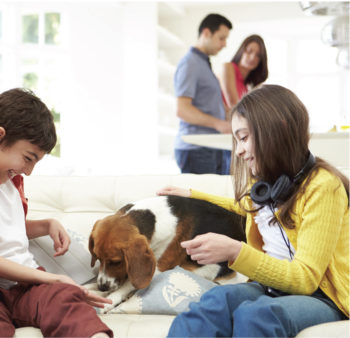 RESPECTING A PET’S SPACE
RESPECTING A PET’S SPACE
– Protecting People and Pets
Pets become such important members of our families that it is sometimes difficult to remember that they are still animals – creatures with innate survival responses that we need to respect. Unfortunately, children are extremely susceptible to triggering these potentially deadly responses if not supervised. Left alone or unsupervised with the family dog, a child runs the risk of injury or even death.
In fact, The Center for Disease Control and Prevention estimates that half of all children 12 years-of-age and under have been bitten by a dog. The majority of those bites were from a dog that the child was acquainted with – the family dog, a neighbor’s or a friend’s dog. Unfortunately, over 79% of all fatal dog attacks are on children and most commonly happen when a child is left unsupervised with a dog.*
Although deadly attacks like these are infrequent, they can and do occur. It does not take an overly-aggressive dog to inflict serious or deadly injuries. Even a gentle animal can bite if provoked. In most instances, it is simply a dog reacting instinctively to fear, confusion, or uncertainty. Dogs rely on their canine instincts to protect themselves and ensure their survival if they feel threatened. Unfortunately, it can be an instant response that does not allow them enough time to identify the attacker.
Many dogs (and cats) are especially uneasy around children because they are inherently noisy, fast-moving, and very unpredictable. The combination of all 3 of these can easily heighten a pet’s alertness and readiness to protect itself.
By following a few simple guidelines, you can greatly reduce the risk of unforeseen attacks by a family pet.
- Never leave a young child alone and unsupervised with an animal.
- Never approach any animal while he or she is eating, sleeping, chewing on a toy, or caring for its young.
- Always pet animals gently – with no pulling or tugging on their fur.
- Don’t make loud noises or sudden moves when approaching any animal.
- Do not touch the animal’s eyes, ears, nose, mouth or genitals.
- Don’t let your child approach or touch a dog during times of heightened excitement. (Barking at someone at the door, eating, etc.)
Most importantly, teach your children that a pet is a living creature to be respected. No matter how much they love and embrace you as a family member, they still have natural instincts they rely on to protect themselves from harm. Respecting their space at all times will help ensure a lifetime of family harmony. ©LVPSM
